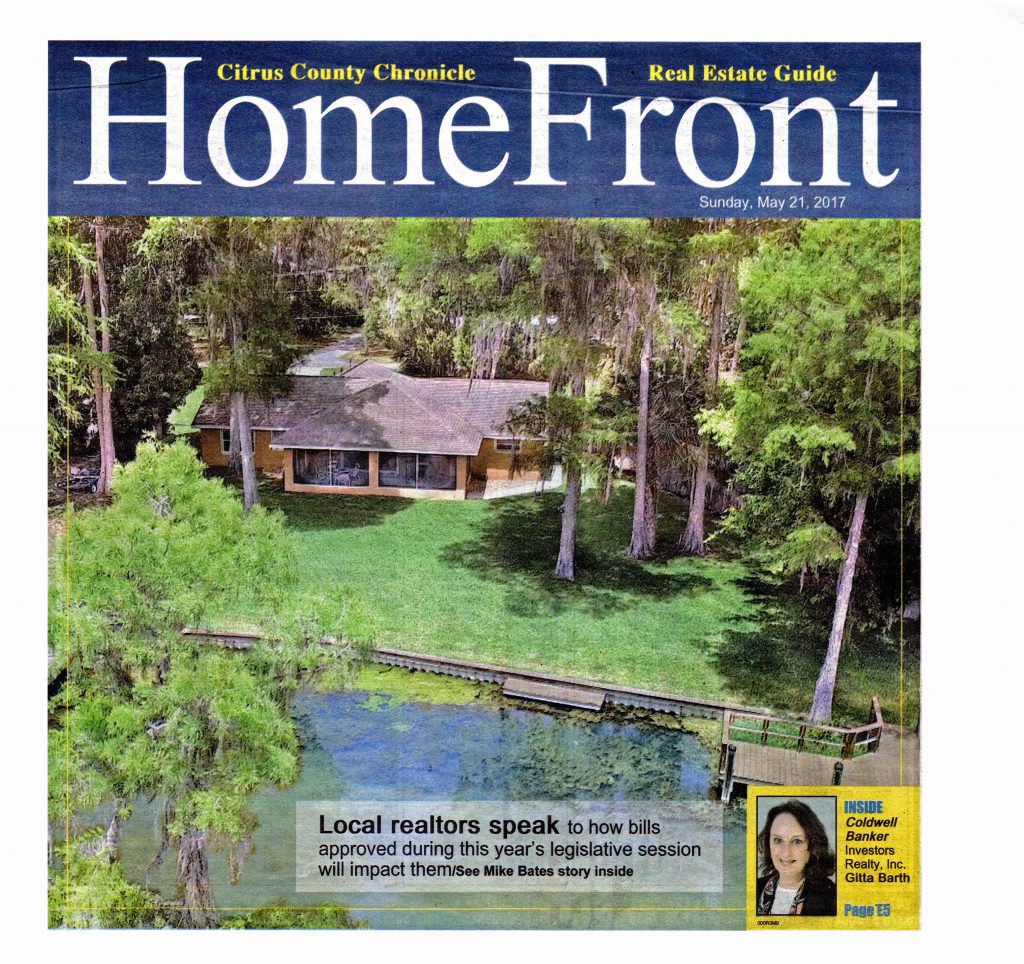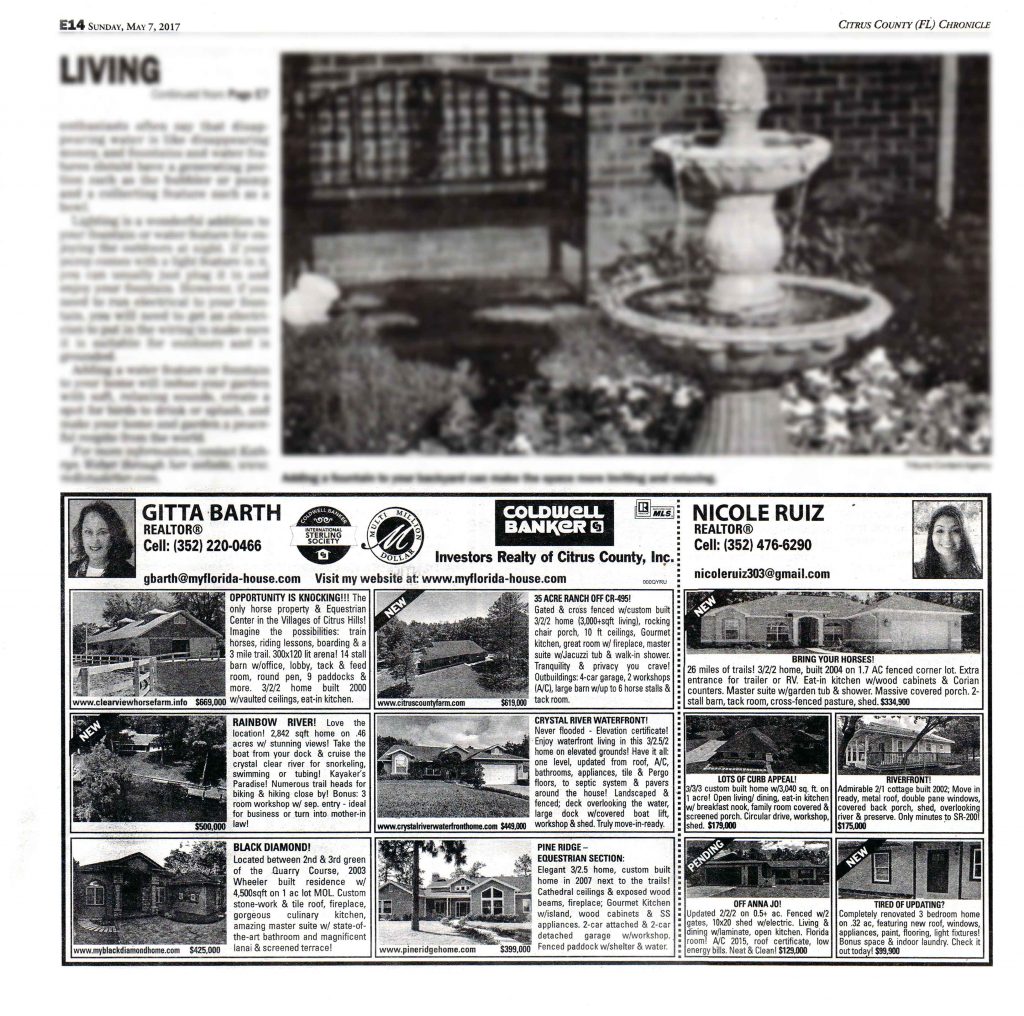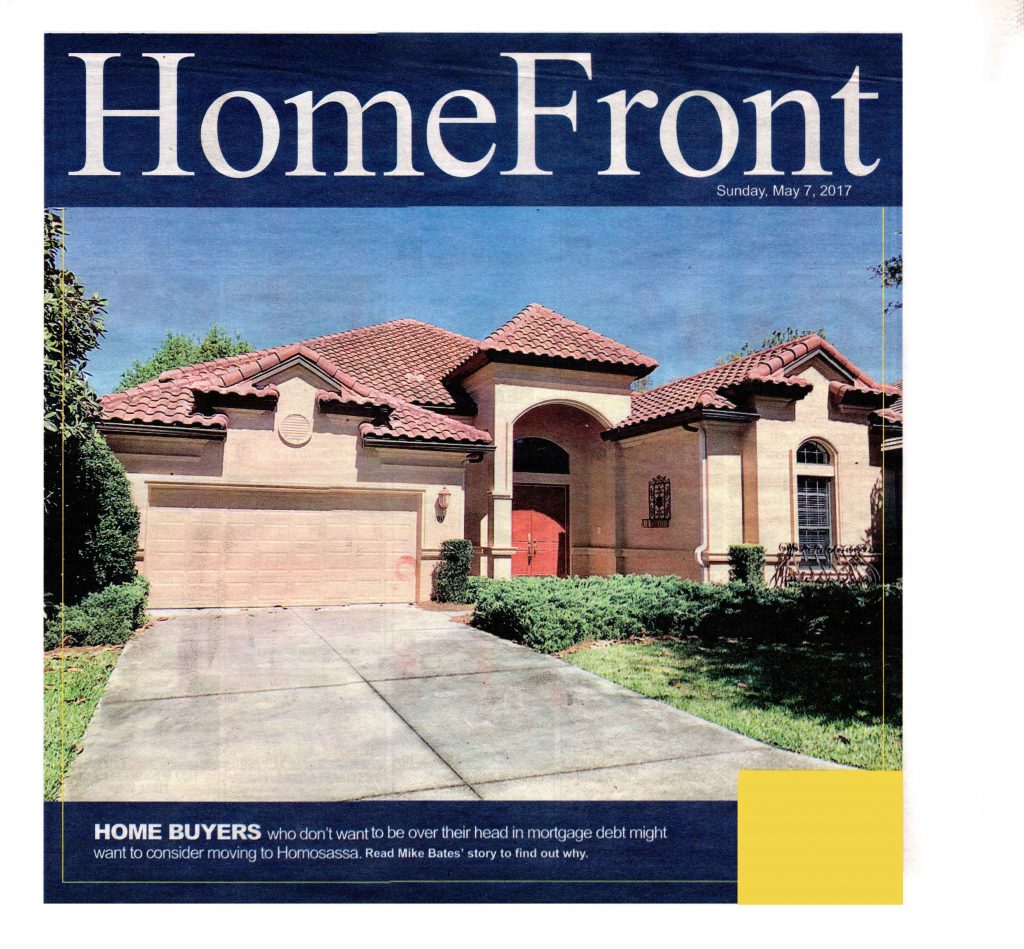My property / real estate for sale listings advertised in the Homefront insert in the Citrus County Chronicle May 21., 2017
The front page shows my riverfront home for sale in Dunnellon at the beautiful Rainbow River.
My Showcase of Homes Ads 20/21 May 2017 in the Tampa Bay News
My Homefront Ads 7. May 2017 in the Citrus County Chronicle
Legislature passes estoppel certificate fee reform
Legislature passes long awaited estoppel certificate fee reform
TALLAHASSEE, Fla. – April 28, 2017 – Florida Realtors scored a big legislative victory today
following the passage of a bill that caps estoppel certificate fees, among other changes.
The passage of the Estoppel Certificate Fee Reform, HB 483/SB 398, which will head to Gov. Scott for his signature.
This completes a multi-year effort by Florida Realtors to reign in the unreasonable fees,
that some association management companies have been charging for estoppel certificates.
“Congratulations to all of our members who have contributed their time and energy trying to fix this problem,”
says Carrie O’Rourke, vice president of public policy for Florida Realtors.
“After several years of educating legislators and building support in both legislative chambers
on the issue of estoppel certificate fees, we brought home a huge victory for home sellers.”
What covers the Estoppel Certificate Fee Reform?
An estoppel certificate provides a snapshot of the fees or assessments that a seller may owe
to their community association. It’s provided by the association or management company when a property is being sold.
Prior to this legislation, Florida law allowed associations to charge a “reasonable” fee
to prepare an estoppel certificate. But without any context on what the word reasonable means,
some association management companies were charging very unreasonable fees.
HB 483/SB 398 cap the fees that community association management companies can charge for
estoppel certificates at $250 for unit owners who are current in their assessments.
An additional $100 can be charged for “expedited” estoppel certificates (delivered within three business days).
And another $150 can be charged for owners who are delinquent in their assessments.
This is a maximum of $500 for an expedited, delinquent estoppel certificate.
Once signed into law, these statutory caps will go a long way to curb the extraordinary charges
that property owners have been forced to pay across the state – like an estoppel letter
that cost $1,610 on the sale of a property that was sold for $190,000.
HB 483/SB 398 also require certificates to be valid for 30 days.
And it will provide for a standard estoppel certificate form to ensure the same information is provided to owners across Florida.
HB 483 was sponsored by Rep. Byron Donalds (R-Naples). SB 398 was sponsored by Sen. Kathleen Passidomo (R-Naples).
Once the bill is signed into law, it will take effect July 1, 2017.
© 2017 Florida Realtors
Read this article about the Estoppel Certificate Fee Reform on Florida Realtors website.
So Your Credit Score is to low to buy a Home ???
Quote:
“The widespread myth that perfect credit and large down payments are necessary to buy a home are holding many potential home buyers on the sidelines. According to Ellie Mae’s latest Origination Report, the average FICO score for all closed loans in May was 724, far lower than the 750 or 800 that many buyers believe to be true.”
Read more about this on one of my favorite blogs from KCM!
NAR Study: A Good Time to Buy
NAR study: Most in U.S. say it’s a good time to buy
WASHINGTON – July 13, 2016 – Despite lackluster economic growth and stark home-price appreciation in several parts of the country in recent months, roughly three-quarters of surveyed households still believe it’s a good time to buy a home – but there’s a considerable morale gap between homeowners and renters, according to the latest installment of the National Association of Realtors® (NAR) Housing Opportunities and Market Experience (HOME) survey.
The survey also found that roughly half of young adults with student debt are uncomfortable about taking on a mortgage.
In NAR’s second quarter HOME consumer survey, respondents were asked about their confidence in the U.S. economy and various questions about their housing expectations, including whether student debt is tempering their ability and appetite to take on mortgage debt.
NAR’s survey found that the share of homeowners and renters who believe it’s a good time to buy a home has held steady so far this year, with 80 percent of homeowners (82 percent in March) and 62 percent of renters (unchanged from last quarter) saying it’s a good time to buy. However, the share of renters who think so is down from 68 percent in December 2015, and those under 35 were the least confident.
Lawrence Yun, NAR chief economist, says the survey brings to focus the ongoing disparity in buyer confidence between current homeowners and renters.
“Existing-home prices surpassed their all-time peak this spring and have climbed on average over 5 percent nationally through the first five months of the year, and even faster in areas with severe supply shortages,” he says. “Most homeowners appear to realize that if they’re ready to sell, they’ll likely find a buyer rather quickly and be able to use the sizeable equity they’ve accumulated in recent years towards their next home purchase. Meanwhile, renters interested in buying continue to face minimal choices, strong competition and home prices growing faster than their incomes.
“Given these affordability pressures, it’s no surprise respondents earning over $100,000 and those living in the Midwest – the most affordable region of the country – are the most optimistic about buying right now,” says Yun.
This HOME survey also found that student debt is causing many potential homebuyers to be uneasy about taking on additional debt: Roughly two-thirds of non-homeowners and half of respondents under 35 with student debt said they aren’t comfortable also having a mortgage. Furthermore, of those with student debt, non-homeowners and younger adults were less likely to believe they’d be able to qualify for a mortgage if they applied.
“It’s becoming very evident from this survey and our research released last month that the financial and emotional impact of repaying student debt is contributing to a delay in purchasing a home for many would-be buyers,” adds Yun. “At a time of quickly rising rents, mortgage rates at all-time lows and increasing housing wealth, a lot of young adults in their prime buying years are struggling to enter the market and are ultimately missing out on the stability and wealth accumulation that owning a home can provide.”
Attitudes about U.S. economy, personal finances outlook mostly unchanged
About half of all households surveyed believe the economy is improving (49 percent), which is mostly unchanged since the inaugural HOME survey in December 2015. Renters, respondents living in urban areas, and those in the West were the most optimistic.
On the other hand, nearly two-thirds of those living in rural areas don’t believe the economy is improving.
When asked if they thought their personal financial situation would be better in six months, the latest survey reflected a little less optimism. The survey’s monthly Personal Financial Outlook Index of all households decreased slightly (to 57.7 in June) month-to-month (58.1 in March), but it’s unchanged from June 2015.
More believe it’s a good time to sell
With strong price growth prevalent in most of the country and homes selling at a quickened pace, more current homeowners (61 percent) believe it’s a good time to sell compared to the first quarter of this year (56 percent). Respondents in the West were again the most likely to think now is a good time to sell, but they’re also least likely to think it’s a good time to buy.
“More homeowners acknowledging this pent-up demand may perhaps mean we begin to see more supply come online in the near future,” adds Yun.
When asked about their outlook for home prices in their community in the next six months, almost all believe that prices will stay the same or rise (93 percent), which is consistent with last quarter (91 percent). Respondents from the West, those living in urban areas and renters are most likely to believe prices will go up in their communities.
© 2016 Florida Realtors®
Link to full article in the FL Realtor Magazine
Florida’s Foreclosure Rate Dropping
Fla.’s foreclosure rate dropping, state now No. 4
IRVINE, Calif. – July 14, 2016 – While Florida continues to have a higher number of foreclosures, the total number continues to drop, and the state’s U.S. ranking is in decline as it moves from its often No. 1 spot down to No. 4 in RealtyTrac’s 2016 U.S. Foreclosure Market Report.
New Jersey now tops RealtyTrac’s foreclosure-rate list (0.98 percent of housing units with a foreclosure filing) followed by Maryland (0.90 percent) and Delaware (0.78 percent). In fourth place, Florida (0.70 percent) still outranks its long-time competitor for the top spot, Nevada (0.68 percent).
The top 10 list of foreclosure-rate states for the first six months of 2016 is rounded out by Illinois (0.61 percent), Ohio (0.54 percent), South Carolina (0.54 percent), Connecticut (0.48 percent) and Indiana (0.47 percent).
In a look at foreclosure rates by metro area, Florida has three cities in the top 10: Lakeland-Winter Haven was No. 4 (0.91 percent), Tampa-St. Petersburg was No. 8 (0.85 percent) and Jacksonville was No. 9 (0.80 percent). The top U.S. foreclosure cities were Trenton, New Jersey (1.31 percent) and Baltimore (0.96 percent).
“South Florida saw a 34 percent drop in foreclosure filings year-over-year,” says Mike Pappas, president and CEO at Keyes Company. “With strong employment, low interest rates and with lenders continuing to carefully scrutinize borrowers – foreclosures will soon be at the lowest levels in a decade.”
The length of time it takes from first foreclosure notice to final judgment continues to impact the Florida market. In the state with the longest foreclosure timeline, New Jersey, it takes 1,249 days. It’s followed by Hawaii (1,236 days), New York (1,058 days), Utah (1,025 days) and Florida (1,012 days).
According to RealtyTrac, investors buy 1 in 4 foreclosed homes: 27 percent of all properties sold at foreclosure auction were purchased by third-party investors. It’s the highest share for the first six months of any year since 2000 – the earliest national data is available.
National foreclosure details
The U.S. had a total of 533,813 U.S. properties with foreclosure filings – default notices, scheduled auctions or bank repossessions – in the first six months of 2016, down 20 percent from the previous six months and down 11 percent from the first six months of 2015.
Counter to the national trend, 19 states posted year-over-year increases in foreclosure activity in the first half of 2016. Among the nation’s 20 most-populated metro areas, five posted year-over-year increases in foreclosure activity.
“Although there are some local outliers, the downward foreclosure trend continued in the first half of 2016 in most markets nationwide,” says Daren Blomquist, senior vice president at RealtyTrac.
“While U.S. foreclosure activity is still above its pre-recession levels, many of the states hit hardest by the housing crisis have now dropped below pre-recession foreclosure activity levels,” he adds. “With some exceptions, states with foreclosure activity continuing to run above pre-recession levels tend to be those with protracted foreclosure timelines still working through legacy distress from the last housing bust.”
States where Q2 2016 foreclosure activity was still above pre-recession averages: Florida (26 percent above pre-recession levels), New Jersey (215 percent above), Illinois (36 percent above), New York (127 percent above), Indiana (2 percent above), South Carolina (376 percent above), Massachusetts (127 percent above) and Washington (29 percent above).
© 2016 Florida Realtors®
New FHA rules created to protect at-risk homeowners
WASHINGTON – July 1, 2016 – HUD announced changes to its Distressed Asset Stabilization Program (DASP), which sells severely delinquent FHA mortgages to private investors. HUD says the new rules should protect homeowners from “payment shock.”
According to HUD, “certain families with distressed mortgages insured by the Federal Housing Administration (FHA) may soon be eligible for a reduction of their outstanding loan amounts should their mortgages be sold through DASP.”
On average, mortgages sold through DASP are 29 months delinquent at the time of the auction.
Additional details on the latest enhancements are posted on HUD’s website.
“While thousands of homeowners avoided foreclosure through this note sales program, we continue to explore new ways to help these families and to offer more opportunities for public-minded organizations to have a seat at the table,” says Ed Golding, HUD’s Principal Deputy Assistant Secretary for the Office of Housing.
FHA’s new DASP enhancements include:
- Principal reduction/capital arrearage forgiveness
Principal forgiveness is the first option investors must consider when evaluating borrowers for a modification
- Payment shock protection
FHA will limit interest rate increases to no more than one percent per year after a five-year period where the rate is fixed
- Walk-away prohibition
FHA prohibits any purchaser of single-family mortgages under DASP from abandoning lower value properties in order to prevent neighborhood blight
- Alternative bidding for non-profit buyers
Qualified non-profit organizations may now bid on a partial pool of notes – up to five percent of a National Pool – and to pay the reserve price. This offers another opportunity for non-profit organizations and local governments to participate in DASP, HUD says
- Streamline direct sales to government entities
FHA is providing new standard guidance on the sale of distressed mortgages directly to qualified government entities and local governments
- Target loans for DASP sales based on the non-profits and local governments
FHA says it will enhance its efforts to identify and offer loans in targeted distressed areas to non-profits and local governments
FHA strengthened DASP last year, too. It expanded a foreclosure moratorium from six-to-12 months, requiring purchasers of these distressed mortgages to suspend any foreclosure action. It also provided advanced notice of pending sales and extended the due diligence periods; offered a “first look” opportunity for non-profits to purchase vacant properties; and created specific pools of mortgages exclusively for non-profit organizations and local governments.
© 2016 Florida Realtors®
This article on the Florida Realtors Website
Study: Gated community homes sell for more
BOCA RATON, Fla. – July 1, 2016 – Homes in gated communities command significantly higher prices – almost $30,000 on average – compared to similar homes in communities without a gate. However, gated neighborhoods’ additional amenities can also reduce sale prices because they bring maintenance costs that outweigh the benefits of the amenities, according to recent research published by the American Real Estate Society (ARES).
“This study provides clear evidence that homes in gated communities sell at a premium relative to comparable homes in non-gated communities,” says ARES Publication Director Ken Johnson, Ph.D., a real estate economist at Florida Atlantic University’s (FAU) College of Business and co-developer of the Beracha, Hardin and Johnson Buy vs. Rent Index.
The study examined 11 gated communities and a sample of matched non-gated properties, using a data set of housing sales in Shelby County, Tennessee. The researchers found that residential properties in gated communities command a noticeable price premium of approximately $30,000, most likely resulting from actual or perceived benefits associated with additional privacy, homeowner associations’ tighter controls on maintenance, home design and the added assurances against crime and other undesirable activities.
“Additional maintenance costs associated with these amenities often outweigh their benefits, and it appears that while a gate has value, additional neighborhood amenities do not always provide additional value,” says Mark A. Sunderman, Ph.D., University of Memphis.
So, what does all this mean to buyers and sellers?
“The long-held belief that gates add value is supported by the data, as long as the impact of the amenities is properly factored in,” Johnson says. “This should set buyers’ minds to rest as to whether or not they are actually receiving a boost in value when they purchase inside a gated community.”
© 2016 Florida Realtors®
This article on the Florida Realtors Website
The ‘Brexit’ and Florida Real Estate
‘Brexit’ could boost U.S. real estate – or not
ORLANDO, Fla. – June 27, 2016 – Britain’s vote to exit the European Union (EU) will likely have a long-term impact on the world economy – but in the short-term, U.S. real estate could be flooded with investors flocking to the U.S. as a safe haven, pushing up the dollar and sending down mortgage rates.
“Demand for U.S. real estate could rise,” says NAR Chief Economist Lawrence Yun.
On the commercial side, global corporations could show additional interest in U.S. real estate as they come to see the U.K. as a less certain place to set up or maintain their businesses, Yun says, “especially in London as it becomes a less attractive place to conduct global business.”
While a rise in the dollar could hurt U.S. exports, it’s also expected to put downward pressure on long-term mortgage interest rates.
“Mortgage rates will tumble,” says Greg McBride, chief financial analyst at Bankrate.com, “possibly hitting new record lows. If you’re a borrower, don’t wait to lock in your rate, as this opportunity may not last long.”
However, Fannie Mae Chief Economist Doug Duncan says low rates could last for a while. “The Fed will very likely be on hold for some time as it observes the impact on U.S. and global financial markets and economic activity,” he says.
If mortgage rates – already at historic lows – drop even further, that could help drive up sales of all types of U.S. real estate, including on the residential side.
In addition, foreign households who might have otherwise looked to London to buy might turn to U.S. residential real estate, although U.K. citizens, who historically are among the top buyers of investment and vacation homes in the U.S., could pull back. “The British economy will be disrupted, and hence we should expect fewer Brits able to buy in the U.S.,” Yun says.
Steve Rick, chief economist at CUNA Mutual Group, was quoted in a Bankrate.com article saying a further drop in mortgage interest rates could give new life to home-mortgage refinancing, which started to cool early this year after several years of big growth. “This would create another mini-refinance mortgage boom at financial institutions, as homeowners rush to lock in near-historic low interest rates,” he said.
In the long run, though, the uncertainty stemming from the vote could cause broad global weakening, which would hurt jobs, income and consumer confidence. That would be a net-negative for U.S. real estate, even if it sees gains in the short-term.
Source: Robert Freedman, Realtor® Magazine
© 2016 Florida Realtors®






